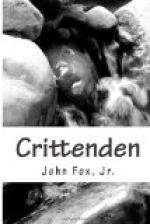Thus it was that day all around the shining circle of sheathed bayonets, silent carbines, and dumb cannon-mouths at the American trenches around Santiago, where the fighting was done.
And on a little knoll not far away stood Sergeant Crittenden, swaying on his feet—colour-sergeant to the folds of the ever-victorious, ever-beloved Old Glory waving over him, with a strange new wave of feeling surging through him. For then and there, Crittenden, Southerner, died straightway and through a travail of wounds, suffering, sickness, devotion, and love for that flag—Crittenden, American, was born. And just at that proud moment, he would feel once more the dizziness seize him. The world would turn dark, and again he would sink slowly.
And again, when all this was over, the sick man would go back to the long grass and tramp it once more until his legs ached and his brain swam. And when it was the hill that he could see, he was quiet and got rest for a while; and when it was the figure of Judith—he knew now that it was Judith—he would call aloud for her, just as he did in the hospital at Siboney. And always the tramp through the long grass would begin again—
Tramp—tramp—tramp.
He was very tired, but there was the long grass ahead of him, and he must get through it somehow.
Tramp—tramp—tramp.
* * * * *
XIV
Autumn came and the Legion was coming home—Basil was coming home. And Phyllis was for one hour haughty and unforgiving over what she called his shameful neglect and, for another, in a fever of unrest to see him. No, she was not going to meet him. She would wait for him at her own home, and he could come to her there with the honours of war on his brow and plead on bended knee to be forgiven. At least that was the picture that she sometimes surprised in her own mind, though she did not want Basil kneeling to anybody—not even to her.




